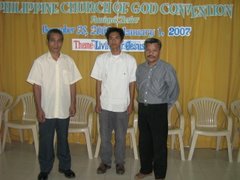TWO DEFINITE CLEANSINGS by Harold Barber
The Purging of the Branches
or
Two Definite Cleansings
By
Harold Barber
"I am the true vine, and my Father is the husbandman. Every branch is me that beareth not fruit he taketh away: and every branch that beareth fruit, he purgeth it, that it may bring forth more fruit." John 15:1-2 "Husbands, love your wives, even as Christ also loved the church, and gave himself for it; that he might sanctify and cleanse it with the washing of water by the word." Ephesians 5:25-26 In these two scripture readings we have a truth set forth that is being denied by many religious teachers of our day. Jesus says in the first reading that every branch in me that beareth fruit, he (the husbandman) purgeth it, that it may bring forth more fruit. In the second reading Paul says Jesus loved the church "and gave himself for it (the church); that he might sanctify and cleanse it (the church) with the washing of water by the word." In these two readings we have the truth set forth that the branches are to be purged (cleansed or purified) and the church is to be cleansed. We dare not deny this truth lest we lose our precious soul. I will endeavour, by the leadership of the Holy Spirit and the scriptures show you the branches are truly purged after they become branches, and the church is cleansed after it becomes the church.
WHO ARE THE BRANCHES, AND WHAT IS THE CHURCH?
First, we want to determine, by the scriptures, who are the branches and how do we become a member of the church? They are both the same. The true branches constitute the church and the church is made up of the branches. The church is the body of Christ and is made up of all those who are saved, both in heaven and in the earth. And all who are saved are branches. In the 15th chapter of
"I am the door: by me if any man enter in, he shall be saved, and shall go in and out, and find pasture." John 10:9 In this verse Jesus states that He is the door and if any man enter in he shall be saved. Jesus is the door into the sheepfold of God; He is the door into the
"Abide in me, and I in you. As the branch cannot bear fruit of itself, except it abide in the vine; no more can ye, except ye abide in me. John 15:4 This is true in a natural sense and also in a spiritual sense. Unless the branch abides in the vine it cannot bear fruit, so we must abide in Christ. People who repent of their sins and are converted are in Christ as a branch and immediately begin to bear the fruit of the true vine is holiness. "If the root be holy, so are the branches." Romans 11:16 "Therefore if any man be in Christ, he is a new creature: old things are passed away; behold, all things are become new." 2 Corinthians 5:17 Men’s lives are changed, the fruit of their doings are different after they have repented and been born of God. If you supposedly repented and your life didn't realize a marked change then you didn't go deep enough. Men who are converted, born again, are in Christ and the fruit of their lives is holiness. They bear the fruit of the true and heavenly vine, which is holiness. Then we'll say, according to the scriptures, those who have forsaken sin and repented are born of God; they have entered Christ; become a branch in Him; become a member of the true Bible church and are bearing the fruit of Christ, which is the fruit of holiness. There is only one standard of living for Christian people and that standard is holiness or sinless living. "He that committeth sin is of the devil." "Whosoever is born of God doth not commit sin." 1 John 3: 8-9 The disciples to whom Jesus spoke the words in John 15:1 and 2 had been converted, born of the Spirit and were not of this world even as Jesus was not of this world. They were bearing the fruit of righteousness and had been preaching the gospel, yet He said the branches in me that bear fruit are to be purged and He was speaking directly to them.
FROM WHAT DO THE BRANCHES NEED CLEANSING?
The branches need cleansing or purifying from native depravity, carnality, or inherited sin. The person who has been born of God has been forgiven of his actual committed sins but there still remains within the depravity that was inherited from Adam. The disciples to whom Jesus was speaking on the occasion the 15th chapter of
Depraved means corrupt or evil and the Bible pictures the heart of man as such from the time he comes into the world. Within 2500 years after creation, "God saw that the wickedness of man was great in the earth, and that every imagination of the thoughts of his heart was only evil continually." Genesis 6:5 "For the imagination of man's heart is evil from his youth." Genesis 8:21 "Yea, also the heart of the sons of men is full of evil, and madness is in their heart while they live." Ecclesiastes 9:3 "The heart is deceitful above all things, and desperately wicked: who can know it?" Jeremiah 17:9 In these scripture texts the heart of man, which is the seat of affections and originating place of the actions of life, is spoken of as being evil. These stated truths concerning the corruptness of man’s heart cannot be understood as being a depravity acquired by personal choice and personal conduct but rather the general sinful condition of all men’s hearts as a result of native sinful character inherited from Adam. In Romans 7th chapter Paul brings out most plain the fact that men’s hearts are sinful from their birth into the world. "For I was alive without the law once: but when the commandment came, sin revived, and I died." Verse 9 Paul says; I was alive without the law once. When was he alive without the law? When he was in his infancy and during the time before he came into an understanding of the commandments of God. "Nay, I had not known sin, but by the law: for I had not known lust, except the law had said, Thou shalt not covet." While he was in this state he says, "he was alive without the law," and at the same time he says; "For without the law sin was dead." Verse 8 During the time he was alive without the law because of no understanding, the sin that was in him was reckoned as being dead, or wasn't charged to him, because of lack of understanding and accountability. Later on when he came to know the commandments and understand them he transgressed them, and sin revived and he died. Notice the statement; sin revived." Revive means to restore to consciousness or life. Sin could not have revived unless it was there. The same is a true experience in the life of every person. When a child, we had no understanding of the laws and commandments of God, therefore, we were alive without the law. Yet while that condition existed wherein we were alive without the law; "without the law the sin was dead." The little child that dies before reaching the age of accountability goes to heaven because he's alive without the law. He doesn't know the commandments of God and therefore is not responsible. Yet while he is without the law because of infancy and lack of knowledge sin is there but is reckoned as dead. When he reaches accountability he transgresses the laws of God because of the nature within him and becomes responsible—sin revives--comes to consciousness or to life. Every person who reaches the age of accountability goes into sin. Why? Not because of a personal choice but because of the sinful nature that within him.
IF ONE DIED FOR ALL, THEN WERE ALL DEAD
In the 5th chapter of Romans Paul definitely establishes the fact that condemnation came upon all men because of Adam’s offence. Study closely this chapter from verses 12 through 19. In these verses Paul states that sin entered into the world through the offence of one man and death came by sin, and so death passed upon all men, for that all have sinned. He continues on through these verses speaking of the offence and the free gift; the offence coming upon all men by the disobedience of one, Adam, and the free gift of salvation coming upon all (who will receive it) through the obedience of one, Christ. In verse 18 he says; "Therefore as by the offence of one (Adam) judgment came upon all men to condemnation . . ." Also in 2 Corinthians 5:14 he says; "For the love of Christ constraineth us; because we thus judge, that if one died for all, then were all dead." If there be no inherited sinful nature; no depraved nature as the result of
Go with me to Ephesians 2:3. There Paul states the fact that in times past we all had our conversation in the lusts of our flesh, fulfilling the desires of the flesh and mind and were BY NATURE THE CHILDREN OF WRATH, EVEN AS OTHERS. What is the meaning of this expression, "by nature the children of wrath?" The expression "by nature means by birth, and the expression "children of wrath" means they were sinful by birth or by their very nature and Gods wrath abode upon them, even as it did others. He is not in any sense referring to sins that were committed by personal choice that caused them to be the "children of wrath," but rather the sinfulness of their nature from their birth into this world. How could he say, "We all had our conversation in times past" if it were not by nature and included all mankind. If they were "children of wrath" by personal choice then he could not say we all had our conversation in times past." If we are not all by nature the children of wrath then we must conclude that some are born into the world with the nature of holiness and will never sin, therefore will never need the Saviour of the world. In the gospel of St. Mark 7:21-23 Jesus says; "For from within, out of the heart of men, proceed evil thoughts, adulteries, fornications, murders, thefts, covetousness, wickedness, deceit, lasciviousness, an evil eye, blasphemy, pride, foolishness: all these evil things COME FROM WITHIN, and defile the man." If men were innocent and pure in their heart and nature from birth how can such evil things as mentioned here come from within? The heart of men is the very fountainhead of wickedness in this world, the seed having been sown by Satan back in the Garden of Eden. These sins Jesus mentions here would not originate from within, but from without if men had not a sinful nature.
David said; "The wicked are estranged from the womb: they go astray as soon as they be born, speaking lies." Psalm 58:3 There is a natural tendency in every person to sin. In the heart of the little child is a very outspoken tendency to sin. Even though the little child is innocent before God because it doesn't know right from wrong, yet very early in life it displays selfishness, hatred, falsehood, anger and many other such things. As parents we teach our children and train them as best we can to try to curb these tendencies but in spite of all teaching and training, threatening and administering the rod, they sin. Why? Because of the sinful nature within them. Therefore Paul says, "that every mouth may be stopped, and all the world may become guilty before God." Romans 3:19 If guilt is universal; if the world is guilty before God there must be a first cause that is as universal as the guilt. That first cause dates back to
DEPRAVITY REMAINS IN THE BRANCH UNTIL SANCTIFIED
In our scripture texts at the beginning of this epistle Jesus says there is a purging for the branches and the branches are those disciples who have been saved or cleansed from the stain of sins committed. Within their nature remains the depravity they inherited from the first Adam. This sinful nature cannot be forgiven because you possessed it, not from a choice of your own but from your birth; therefore, it must be destroyed by the fire of the Holy Ghost. According to Jesus' teachings in John 14:15 to 18 the Spirit of truth, which is the Holy Ghost, was to be given to "born again" people and not to the world. On the day of Pentecost this pouring out of the Spirit of truth upon these very same disciples took place thus fulfilling the promise of the Father to his children and purifying their hearts by faith. The heart of the "born again" person is not fully cleansed from every trace of sin and will not be until it has been baptized by the fires of the Holy Ghost. There are two definite experiences of grace taught in the Bible and in both there is a cleansing for the soul of man.
SANCTIFICATION IS THE BAPTISM OF THE HOLY GHOST
There are many religious teachers who will readily agree the Bible teaches two works of grace but not two cleansings. They teach sanctification as a progressive work wherein we sanctify ourselves by consecrating ourselves to the service of God and the baptism of the Holy Ghost as an experience where the heart is empowered by the Spirit but not a cleansing. Such a teaching as this does not harmonize with the scriptures but it definitely refuted by them.
I know no better place to go than the scriptures, so we'll take the disciples and the scriptures as an example. In John 15:1 and 2 Jesus taught his disciples that He was the true vine and His Father the husbandman. "Every branch in me that beareth not fruit he taketh away: and every branch that beareth fruit, he purgeth it, that it may bring forth more fruit." Here Jesus speaks of purging the branches, and to purge means to cleanse or purify. In John 14:15-18 Jesus said, "If ye love me, keep my commandments. And I will pray the Father, and he shall give you another Comforter, that he may abide with you for ever; Even the Spirit of truth; whom the world cannot receive." In this scripture Jesus is to pray the Father to send another Comforter (the Spirit of truth) to abide with them (his disciples) forever. At that present moment the Spirit of truth was not dwelling in the disciples for Jesus said in verse 17, "for he dwelleth with you, and shall be (in the future) in you. Also in John 17:17 Jesus said, "Sanctify them (his disciples) through thy truth: thy word is truth." Here he is concerned about them being sanctified. Now may I call this to your attention? The three scriptures I have referred to were all spoken by the same Person, (Jesus) and to, and in behalf of, the same group of disciples on the same night. In John 14 He spoke of them receiving the Spirit of truth as an abiding Comforter. In John 15 He spoke of the branches being purged that they might bring forth more fruit. In John 17 He spoke of these disciples being sanctified. Are we to suppose, because He used different terminology, different phraseology in these three scriptures (yet spoken the same night) that He teaches three different experiences for his disciples? Certainly not! He is referring to the same experience each time even though He uses different phraseology. He is referring to the pouring out of the Holy Ghost on the day of Pentecost wherein his disciples were sanctified by the baptism of the Holy Ghost and the branches were purged and made to bear more fruit.
The disciples experience was two-fold. On the night of the betrayal, the night on which the above scriptures were spoken by Jesus, these disciples were not of the world; they had experienced the new birth or conversion and had become branches in Christ. Their names had been written in heaven, and surely no one would deny they had obtained an experience of conversion. Yet Jesus was very much concerned about them being sanctified or receiving the Spirit of truth as an abiding Comforter. Then after the crucifixion and resurrection they beheld the resurrected Christ and received definite instruction from Him to tarry in
SANCTIFICATION IS A WORK OF THE SPIRIT
Sanctification is a work of the Spirit and no one can sanctify himself in the sense it's taught in the New Testament. Many are teaching that sanctification is merely a consecration of one’s self to the service of God. In many of the new translations of the Bible the word sanctification is entirely omitted and the word consecration is used, thus changing the meaning of the scriptures. In one sense the word sanctify and consecrate does mean the same thing. They both mean to set apart for a sacred use or to hallow. But again they do not mean the same thing. The word sanctify also means to purify or to cleanse from sin. In this sense it will require a work of the Spirit of God. Paul says, "God hath from the beginning chosen you to salvation through sanctification of the Spirit and belief of the truth." 2 Thessalonians 2:13 Paul teaches here that God's plan of salvation is to hear and believe the truth of the doctrines of the gospel and in believing and obeying they were to receive the Spirit which would sanctify their souls. The Spirit sanctifying their souls would produce an inward holiness that would bring their lives into conformity with the principles of the gospel.
Also we are being taught that we are not sanctified by the Holy Ghost but by the Word and the Blood. How absurd and ridiculous for anyone to try to make such distinction. Nothing can be performed by the Word to the exclusion of the Spirit; neither can anything be performed by the blood to the exclusion of the Spirit; nor can anything be performed by the Spirit and exclude the blood and the Word. Everything pertaining to the salvation of the soul of man was purchased by the blood of Jesus Christ on the cross of
SANCTIFICATION OR BAPTISM OF THE HOLY GHOST IS A DEFINITE CLEANSING IN THE HEART
In the 15th chapter of Acts we read of a meeting of the church at
"For this is the will of God, even your sanctification." 1 Thessalonians 4:3 Sanctification is an experience for the true "born again" person. Jesus was not praying for the world but for his own disciples who had been cleansed from the world of sin when he prayed, "Sanctify them through thy truth, thy word is truth." It is a work of the Spirit. You have your part to play and the Spirit has His part to play. After you have been cleansed from all your committed sins through repentance and the new birth you are then to consecrate yourself to the service of. God by setting yourself apart from everything; crucifying self and the Spirit will then come and cleanse your heart from every trace of inborn sin. You can consecrate yourself to the service of God but you cannot cleanse yourself from the moral depravity within. This is a work the Spirit must do. Sanctification, or the baptism of the Holy Ghost is the experience wherein the branches are purged and caused to bear more fruit. It is an experience for the children of God today. Dear reader, have you received the Holy Ghost since you believed? Have you sought God for the baptism of the Holy Ghost since you were converted? Has your heart been cleansed from that inborn sin that so often besets the individual as he tries to serve God? If not, why not seek Him now for that experience that will give you real victory every day and cause you to be a living witness for Him.


















































































































